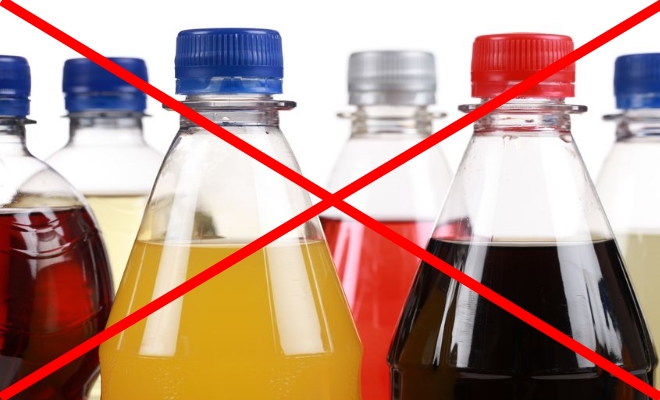If you’re hooked on soda and it seems like your addiction with it can’t ever stop, here are nine reasons we’ll make you think otherwise.
Every health magazine and show may have featured, at one point in time, the bad effects of your soda addiction. You’re not the only victim, as billions of people from around the globe have been hooked drinking soda. Aside from the well-known facts that soda is made up of nothing but sugar water and can then lead to obesity and type II diabetes, there are other dangerous things about soda that you should know today.
Keep reading to learn about the 9 reasons why you should kick your soda-drinking habit to the curb.
- Uneven fat distribution
Latest findings from Danish researchers tell us that consumption of non-diet soda can result in fast buildup of fat around the skeletal muscles and the liver. This uneven fat distribution contributes to the development of insulin resistance and type II diabetes.
Further studies reveal that those who steadily drank regular sofa everyday for half a year showed the following changes:
- 132 to 142 percent increase in liver fat
- 117 to 221 percent jump in skeletal fat
- 30 percent increase in triglyceride blood fat levels
- 11 percent increase in cholesterol when compared alongside those who drank milk and water
- Diet Soda Belly Development
We are all aware of the fact that drinking soda regularly can lead to weight gain. What’s surprising is the fact that diet soda can consumption can result in just about the same amount of weight gain.
According to the University of Texas Health Science Center that conducted a ten-year study of the effects of soda, almost 475 people who made it a habit to drink diet soda gained up to 70% increase in waist circumference when compared alongside those who did not drink soda.
Those who drank two servings of soda per day experienced a 500% waist expansion. The reason for significant increase in weight gain it the aspartame found in almost all soda drinks sold today. It is a compound that successfully raises the blood glucose levels, which in turn causes weight gain and significant body fat conversions.
- Cancer-Causing Caramel
The Center for Science in the Public Interest asked the Food and Drug Administration to ban the use of artificial caramel coloring that is commonly used in famous sodas such as Pepsi and Coca Cola. Two ingredients in these brown sodas were found to cause cancer; 2-methylimidazole and 4-methyimidazole. In addition, these ingredients were found to be unnecessary in that they were only used purely for cosmetic reasons only.
Based on California’s strict Proposition 65 list of cancer-causing chemicals, 16 micrograms of methylimidazole is more than enough to pose cancer threat. Pepsi and Coca Cola are known to contain up to 200 micrograms of this ingredient per 20-ounce bottle.
- Speeds Up Aging
Both regular and diet soda contain phosphates or phosphoric acid. This ingredient is categorized as a weak acid that gives that tangy flavor to soda and prolongs their shelf life.
It is true that phosphate can be found in many whole foods such as dairy, meat products, and nuts, but accumulation of this acid can result in many serious health conditions such as muscle loss, osteoporosis, kidney problems, and may even speed up the process of aging.
In a 2010 study published by the FASEB Journal, excessive levels of phosphates killed lab rats five weeks earlier than the lab rats that revealed normal phosphate levels on their systems.
Despite these alarming findings, soda manufacturers still increase the concentration of phosphates in their products.
- Water Pollutant
Our bodies have no means of breaking down the artificial sweeteners found in diet sodas. Even wastewater-treatment plants do not have the ability or mechanism to get rid of them before they flow through waterways.
In 2009, Swiss scientists tested samples of water from wastewater-treatment plants, lakes, and rivers in Switzerland. They have found high levels of artificial sweeteners such as sucralose, saccharin, and acesulfame in the water.
In the United States, over 19 municipalities revealed the presence of sucralose in their respective water supply.
It is still unclear how low levels of these artificial sweeteners are doing to people, but high levels of these ingredients may interrupt the feeding habits of organisms living in these bodies of water.
- The Mountain Dew Mind
Mountain Dew Mind is a term coined by doctors for a condition resulting from excessive intake of Mountain Dew. The ingredient responsible for this condition is brominated vegetable oil or BVO- which functions to prevent the flavor splitting up from the drink. BVO is an industrial-grade chemical that is mainly used as flame retardant in plastics. BVO is also being added to many citrus-based drinks and sports energy drink. The accumulation of BVO can result in memory loss, and nerve disorders when consumed for a very long time.
Researchers also tell us that brominated flame retardants used in foam furniture facilitates the buildup of harmful chemicals in body fat leading to the development of the following symptoms:
- infertility
- lesions on heart muscles
- behavioral problems
- Hormonal Imbalance
The ingredients found in soda are not the only ones that wreak havoc to the human body. Almost all aluminum cans used to package soda are lined with BPA or bisphenol A, an epoxy resin that keeps the acid from reacting with the metal can. According to studies, BPA interferes with the normal functioning of hormones. It is linked to problems such as obesity, infertility, diabetes type 2, and reproductive cancers.
According to The Centers for Disease Control and Prevention, soda cans along with fast-food, restaurant, and school meals are major sources of serious chemical exposure.
Pepsi and Coca Cola are in a battle to develop a 100% BPA-free plastic bottles, there are yet to comply with developing BPA-free aluminum cans.
- Dead Birds
Thousands of animals, especially birds, die from starvation as a result of ingesting plastic soda caps and bottles. The debris is not properly disposed by users, and are carried away by the currents to the great oceans. The Great Pacific Garbage Patch are mostly made up of aluminum and plastic soda cans that are indigestible to animals, and are known to be harmful pollutants to the environment as a whole.
- Unknown Side Effects of GMOs
When you look at the list of ingredients of any type of soda, you will notice that most of them are sources from corn. Based on data, almost 88% of corn that grow in the United States alone is genetically modified. They are genetically modified so crops can be completely resistant to toxic pesticides or were developed to create pesticides within the plant itself.
There are no studies that can prove that GMOs are harmful to human health. However, independent studies reveal that GMOs cause serious medical conditions such as digestive tract damage, aging, and infertility.












